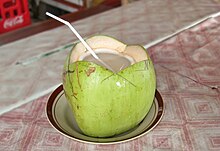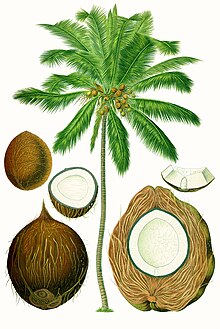It appears we have all gone crazy for coconuts. Walk into
any health food store and you’ll find an amazing array of different coconut
products, from oils, to flakes and flours and waters there seems to be no end
in site to the uses of this delicious tropical fruit.
Where has our fascination with coconut come from, and is it
really all its cracked up to be? Lets take a look at the many forms, and myths surrounding coconuts and their benefits.
Coconut whole
Coconuts as a whole can be purchased in 2 forms, green or
young coconuts, and mature coconuts. Mature coconuts are hairy. Young coconuts
have more water and a softer gel like flesh, which hardens as they age to a
firm flesh.
Each component of the coconut has different benefits, so
I’ll break them down into their parts
Coconut Water
Coconut water is the liquid that comes out of young
coconuts. It is said that it is high in minerals and great for re-hydration.
Now, if you are just after the minerals in coconut water, you can easily get them by
eating enough fruits and vegetables and it will probably be a lot cheaper than buying bottles of the overpriced water.
 Many people suggest that coconut water is a better
alternative to sports drinks. While some make the argument that sports drinks
are scientifically formulated yada yada yada, they are full of sugar. Hugely
full of sugar, in fact. Coconut water also has sugar, but it is natural sugar,
that comes from the fruit, not the scientifically formulated kind. So if you
want a more natural option, (not to mention one free of artificial colouring),
then coconut water may be for you.
Many people suggest that coconut water is a better
alternative to sports drinks. While some make the argument that sports drinks
are scientifically formulated yada yada yada, they are full of sugar. Hugely
full of sugar, in fact. Coconut water also has sugar, but it is natural sugar,
that comes from the fruit, not the scientifically formulated kind. So if you
want a more natural option, (not to mention one free of artificial colouring),
then coconut water may be for you.Check out this great little comparison from Prevention Magazine. It highlights what I said but its alot more fun! http://www.prevention.com/which-healthier-coconut-water-vs-sports-drinks?cm_mmc=Twitter-_-Prevention-_-HFFO-_-CoconutWatervsSportsDrinks
 |
| Prevention Magazine, by Mandy Oaklander |
And coconut water is the winner!
Fructose is a type of sugar that’s been in the media a lot recently and there are many fructose haters out there. Fructose is the sugar thats found naturally in fruits. Table sugar, known as sucrose, is a mix of glucose and fructose, so alot of us are eating diets high in fructose. The good news for people who are trying to avoid fructose, is that coconut water is a relatively low fructose fruit.
I would consider coconut water if you’re looking for a
natural re-hydration formula that’s low in fructose or if you’re just looking
for a little treat, something delicious and sweet to drink. Like anything though, its probably best to check the ingredients and make sure there arent any hidden ingredients. For the average non exerciser who is just wanting to add something healthy to their diet stick to fruit, veges and normal water.
Alternatively, you could try making coconut water kefir. kefir is a fermented product that contains billions of little probiotic bacteria, way more than yoghurt, and is therefore great for gut health (see my post on Improving digestive health). Its readily available in health food stores made from cow and goat milk. I found this great little You Tube clip that shows you how to make the coconut kefir in a variety of different ways. The lovely lady also shows you how to make coconut yoghurt using the flesh. Worth a look if you're wanting to get that coconut in. http://www.youtube.com/watch?v=hw80KpZJ32g. Its about 9 and a half minutes long.
Alternatively, you could try making coconut water kefir. kefir is a fermented product that contains billions of little probiotic bacteria, way more than yoghurt, and is therefore great for gut health (see my post on Improving digestive health). Its readily available in health food stores made from cow and goat milk. I found this great little You Tube clip that shows you how to make the coconut kefir in a variety of different ways. The lovely lady also shows you how to make coconut yoghurt using the flesh. Worth a look if you're wanting to get that coconut in. http://www.youtube.com/watch?v=hw80KpZJ32g. Its about 9 and a half minutes long.
Coconut Oil
This is the mother load when it comes to the coconut and
probably one of the most confusing areas for the every day person. Why? Because
on the label of the bottle it’ll tell you that coconut oil has a substantial
amount of saturated fat. Yes, mmhm, yes it does. What the label doesn’t tell
you is the type of saturated fat and this is the concern for people who are
worried about their cholesterol. Recent research suggests coconut oil may
actually help to lower cholesterol. Coconut oil contains lauric acid, which is
a different fatty acid to the palmitic and stearic acids that we find in red
meat, for example. Lauric acid has some nice health benefits such as being
antiparasitic. Coconut oil is also largely composed of medium chain triglycerides
(MCT’s), meaning it is easily digested and absorbed, so great for anyone who
has problems with their gall bladder or intestinal health.
While some research suggests that coconut oil boosts the metabolism and that coconut helps with weight loss. I
wouldn’t buy it for that purpose. There’s no point taking anything for weight
loss if you haven’t sorted your diet and activity level out.
So, coconut oil? Yes. A good general addition to the diet. Generally speaking, I'dsuggest a max of a tablespoon a day but this could vary. You can blend it in
smoothies, use it as butter, cook with it (although know your food will taste
like coconut, so think about it first). If you’re on a calorie restricted diet, bear
in mind again, being a fat, it is higher in calories.
Coconut oil is a particularly stable oil. You'll notice that if you leave it sit on your kitchen bench in warm weather, it will be liquid. However in winter, or if you have the airconditioner on, it will be solid. It will alternate like this continually and thats perfectly normal.
Coconut oil is a particularly stable oil. You'll notice that if you leave it sit on your kitchen bench in warm weather, it will be liquid. However in winter, or if you have the airconditioner on, it will be solid. It will alternate like this continually and thats perfectly normal.
One thing I would suggest is to choose a good quality oil.
Like all oils, they need to be extracted and you want one that has as little
chemicals and damage to the oil as possible. I would always recommend going for the raw virgin oil.
It will smell more and taste stronger but it is better for you.On the shelf as a solid oil it should be white, or clear if its liquidised. If its coloured it may be contaminated. Never choose
the tasteless options if you want the health benefits, they’ve been processed to death. Price is often a good indicator of quality.
Coconut oil can also be used on the skin and hair as a mosituriser.
Coconut oil can also be used on the skin and hair as a mosituriser.
| Young Coconut and Coconut Icecream. Hot Chilli Restaurant, Chiang Mai, Thailand. Feb 2013 |
| Most delicious dessert ever.. Mmmm |
The coconut flesh can be found in a variety of forms, from coconut flakes to desiccated coconut. They’re also found in flour form for use as a replacement to grain flours. The flesh is high in fibre and a good source of minerals. It makes a nice addition to home made cereals, smoothies, muffins and muesli bars. Certainly if you’re looking to reduce or eliminate grains, the flour comes in handy. The fresh meat will still contain some fat, the dried and flour forms contain a lot less as they press it all out.
Nourishing Gourmet has a gorgeous recipe for banana muffins using coconut flour and almond meal. They are delicious. So moist, just divine. http://www.thenourishinggourmet.com/2012/04/banana-muffins-wbanana-chocolate-chip-option.html.
Don't forget, if you're looking for something to do with the flesh of a fresh coconut, see the You Tube clip on making Kefir and coconut yoghurt!
Coconut Milk and cream
Coconut milk is made by grating the coconut flesh and then pressing it collect
to coconut the milk. Commercially, it is often watered down. Coconut cream has less
water and is therefore thicker.
Coconut milk kefir, like the water variety is also a fantastic way to get probiotics without consuming dairy. Marks Daily Apple provides a great description from everything including sourcing your kefir grains to the final product. Give it a go! http://www.marksdailyapple.com/homemade-coconut-milk-kefir/#axzz2OF4sVdBr
Let me know your thoughts,
Chris

No comments:
Post a Comment